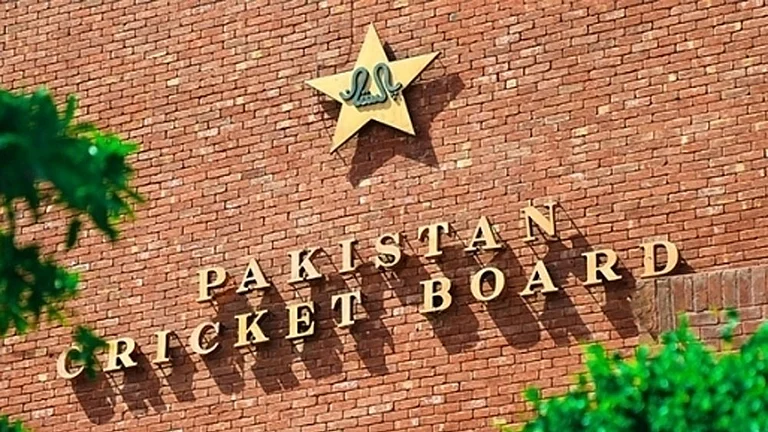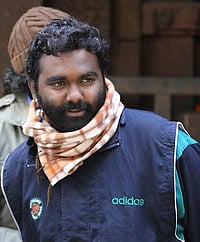It’s evening in Karni colony, Jaipur—the sun is finally threatening to set. Govind, 30, is trying to quell the agitation welling up inside him, but in vain. The 8x8 ft rented room, with a sparse attached kitchen, costs him Rs 6,000 a month. Medicines are arranged neatly on a concrete slab, perhaps to soak up blessings from the gods they share the slab with. His sister and he have been praying. On one side, their mother Yashoda Devi lies motionless on a metal cot—her eyes open, a cooler easing her discomfort. A pipe runs up one of her nostrils, one down her throat. She has stopped speaking.
Yashoda Devi has been here since her discharge from hospital in March. In January, Govind’s mother fell unconscious—her sugar levels had fallen to 45 mg/dL. Her medical report mentions she suffered from ‘Post Hypoglycemic Encephalopathy’.

A very ill Yashoda Devi with her son Govind and daughter. She was put in the ICU till her BSBY money ran out, he alleges.
Govind works in a cloth shop in Churu, in the Shekhawati region, where doctors advised him to take the patient to Jaipur or Bikaner. On January 13, he took her to Jaipur, over 200 km away. (His sister and his mother’s niece live there.) Doctors at the Sawai Man Singh (SMS) Medical College couldn’t admit Yashoda Devi, but said she needed an ICU.
Govind says he went to Apex Hospital next, where doctors refused to admit her under the Bhamashah Swasthya Bima Yojana (BSBY), despite him carrying a card. The scheme, launched in 2015, aims to provide free, cashless healthcare via Aadhaar for BPL families. “They finally made her hospital file under Bhamashah on January 15 after my cousin, a lawyer, asked them to state their refusal in writing. They got a bit scared,” Govind tells Outlook.
Then began the long, tortuous twist in the tale—joining Yashoda’s case to numerous others of seeming and clearer fraud in Jaipur and Alwar districts—all involving the BSBY scheme and how hospitals extract the maximum out of it. Sources gave Outlook details of nearly 100 such instances from across Rajasthan that we haven’t been able to independently verify yet.
How does it play out? Witness Yashoda’s case. For 33 days, she was mostly in Apex’s Neuro ICU. According to receipts seen by Outlook, the BSBY card was charged Rs 8,000 everyday—a total bill of Rs 2,64,000. The card allows for annual treatment of Rs 3 lakh for serious or tertiary illnesses; there was Rs 36,000 left in the account on February 17, when Yashoda Devi was shifted to the general ward on Govind’s insistence. The doctors allowed it with a caveat: “If something happens to her, you’ll have to take her to SMS.”
On those 33 days, Govind says: “(They) kept her on the ventilator for 3-5 days, then took it off. Then they shifted her to the HDU (High Dependency Unit) ward because of rush at the ICU. Why didn’t they shift her to a general ward? She was normal, just not speaking. They put her in an ICU to squeeze Rs 8,000 from us daily, because we had Bhamashah.”
“In fact, she was better off in the general ward. I used to give her oil massages, make her sit up...the ICU attendants would just do the formalities,” says Govind. She had been unconscious in the ICU and HDU, and started opening her eyes in the general ward, he adds.
On March 5, Govind was out of Jaipur to arrange for money. “I knew our BSBY card was running out...what if something happened?” Suddenly, he was told his mother was being shifted back to the ICU. He called his cousin in Mumbai, who lodged a complaint. “Doctors know the patient is poor and doesn’t need ICU. If they’d kept her in general, the money wouldn’t have been spent. Now Rs 3 lakh is over,” says Govind.
A new file was made in Yashoda Devi’s name from March 10 after the BSBY credit ran out. “I asked why they put her back in ICU when she’d gotten better in general. They couldn’t exhaust the money there. They shifted her back to finish that money,” Govind alleges. He now has to spend Rs 2,000-3,000 daily for her medical expenses.
Dr Shailesh Jhawar from Apex confirmed to Outlook over e-mail that Yashoda Devi was “under the care of superspecialty and critical care” and was “shifted to HDU and finally to ward” after her condition “gradually improved”. Jhawar says she “developed fever and had difficulty in breathing” in the general ward, and so was shifted back to ICU for three days “for better monitoring and care”, before being discharged. Her condition was life-threatening and her “recovery...itself proves she was managed properly,” Jhawar writes. He denies a complaint was registered, and claims they have “letters of satisfaction signed by her son” and that “no money (was) charged during the entire stay”.
The Rajasthan government launched the first phase of BSBY on December 13, 2015. New directions for phase two were issued two years later. The medical INSurance scheme has an annual cover of Rs 30,000 for treatment of ordinary diseases, besides Rs 3 lakh for serious ones. Its objectives are to implement cashless treatment, reduce out-of-pocket costs for people seeking private healthcare and ease burden on public hospitals. To be eligible, one has to have a Bhamashah card (made in the woman family-member’s name), and be enrolled under the National Food Security Act.
BSBY followed up on the acclaimed free medicine scheme launched by the Congress government led by Ashok Gehlot in 2011. BSBY was applauded too, with reports saying the National Health Protection Scheme, dubbed ‘Modicare’, was drawn on the lines of Bhamashah Yojana.

Mindro Kaur of Alwar with son Amarjeet. Afflicted by gall bladder stones, she was operated upon, as her scars show here, but was charged by the hospital for laparoscopy against her Bhamashah card
A scrutiny of Bhamashah can, therefore, help plug loopholes, if any, in the national scheme. Take the case of 60-year-old Mindro Kaur from Alwar. She visited the local Anil Hospital to treat her gall bladder stones. The long cut mark on her lower abdomen indicates open surgery, not laparoscopy. But her Bhamashah card shows a deduction of Rs 22,750 for two secondary laparoscopic procedures. Kaur alleges the hospital also charged an additional Rs 20,000. “We gave it.... Whatever they asked, we’d give. We were helpless,” says Mindro. Hospital authorites “got it signed from my relatives that we wouldn’t tell anyone. We didn’t get any bills,” she adds.
Much the same boxes are ticked in the case of Radhey Shyam Saini, 22, a mechanic in Alwar. On December 31, 2017, a hernia operation was performed on him at Global Hospital in Alwar. His Bhamashah card shows a transaction of Rs 15,000 for a laparoscopic procedure. However, he angles down the side of his trousers to show a long incision. He too doesn’t know “how much money they took”.
In some cases, insurance was claimed for procedures allegedly not even performed. Outlook met Ram Kunvar Bhopa, 60, outside his thatched house in Nangli Megha village in Alwar. His wife Rohini had Rs 100 on her when her husband was unable to breathe one night. She took him to Ayaan Hospital where even that bit of money was spent on a receipt.
Ayaan asked them to get a sonography done from an outside facility since they didn’t have the equipment. “I said we have no money. He (Ram Kunvar) said take me back home. But it was night and he was in no state,” she says. Rohini says the doctor relented and admitted her husband but asked them to get the money for sonography the next day. She borrowed it from neighbours—they crowd around her as she speaks.
Ayaan kept him for four days. Ram Kunvar’s Bhamashah card says a “laparoscopic umbilical hernia repair” procedure worth Rs 16,000 was performed on him. The couple vehemently deny this. Ram Kunvar lifts his kurta to show an abdominal area devoid of any marks. They allege they were asked by doctors to keep mum.
In Karwas village of Alwar, Outlook met Ram Singh Jat, who had been treated for hernia at Jeevan Jyoti Hospital where Rs 12,000 had rightly been deducted from his BSBY card. However, an additional amount had been deducted for surgery for haemorrhoids, a problem he didn’t have.
Similarly, Kalyan Sahay from Shahapura village was treated for gall bladder stones, but his BSBY card also shows a hernia procedure. “I never had hernia; I know what it is,” says Sahay, a driver. Tokas Gastro Hospital in Chomu also took money from him for medicines, which he should have received free for ten days, as per the BSBY. Tokas wrote to Outlook, saying sometimes patients are “not able to understand” complex medical issues and a “new USG” (ultrasound) would reveal the truth. If cholecystectomy was mentioned but “not performed”, it would invite charges “under 420”, it admitted.
It’s not just fraud. Sources say the ambiguity within rules allows their abuse. Incredibly, Clause 27 of the second phase’s guidelines allows for three transgressions by hospitals. Clause 28.2.4 also says private hospitals cannot be punished by an insurance company (the payer under the BSBY) if they treat beneficiaries based on packages reserved for government hospitals.
“It’s non-evidence-based,” says Naveen Jain, CEO of Rajasthan State Health Assurance Agency, dismissing the allegations. “Justified action has always been supported by RSHAA/Govt. Till date, 10 hospitals have been de-empanelled.” Jain mentions the rules for de-empanelment and penalties involved in cases of up to three complaints.
“A lot of changes (were made) based on our experiences in the first phase. Criteria of empanelment were made stringent to remove small hospitals where the possibility of fraud was deemed high. De-empanelment without proper hearing is unjustified,” he explains.
The Community Health Centre in Govindgarh, Alwar, is a shambolic mess. A staffer isn’t sure “how many beds” they have. The register shows seven patients admitted under Bhamashah on March 23. Only two could be seen in the ward—both boys watching a video on a mobile phone lying on a single bed. A dog roams around. A relative of a patient is asked to arrange for tea.
Bizarre? Maybe.
Insurance claims under BSBY were at about Rs 320 crore in 2015-16 and rose to Rs 545 crore in 2016-17. In the first week of phase two, claims for Rs 7.5 crore were made, rising to Rs 18 crore in the 10th week. Jain attributes it to increasing “patient awareness” and the fact that the number of empanelled private hospitals has increased from 170 to 707 in just over two years. All of them, no doubt, scoring high on “awareness” about the scheme.
By Siddhartha Mishra in Jaipur


























